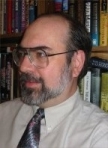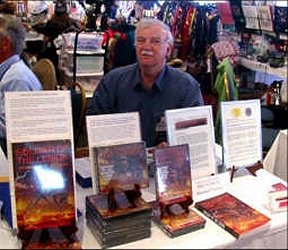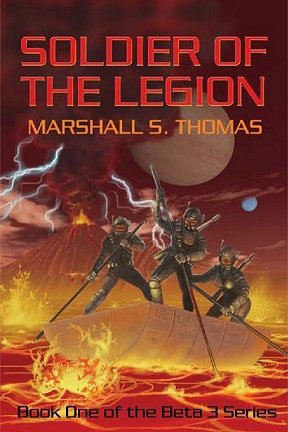

|
An Interview with Marshall S. Thomas
|
|
I want to be just like Marshall Thomas when I grow up.
By that I don't mean I want to retire from a 35-year US Foreign Service Office career with postings in a variety of East Asian countries. Nor do I necessarily want to be the author of one published SF novel with three sequels in the pipeline (though that does sound pretty cool).
|

|
What I find most inspiring about Thomas is that after a lifetime of "deal(ing) with the real world" - having a career, getting married, raising children - he had the guts and determination to re-invent himself and turn an avocation into a successful full-time occupation. And he's having the time of his life doing it.

I first met Marshall Thomas via email, after learning that he would be a guest author at Balticon 39. The face-to-face meeting took place during the first few hectic setup hours in the Dealers Room at Balticon, where Thomas manned a table to meet his fans and sell copies of his first novel, the military SF thriller Soldier of the Legion. Articulate yet soft-spoken, Thomas' enthusiastic enjoyment of the writing life was quite evident during our conversations, both in the Dealers Room and later over dinner.

Following is my interview with Marshall Thomas.
BookThink: Philip K Dick once said (in "An Interview With America's Most Brilliant Science-Fiction Writer" by Joe Vitale, The Aquarian, No. 11, October 11-18, 1978) that "a writer writes because it's his response to the world." Dick's need to write was a response to his fundamental sense of indignation with the world. You began writing seriously in 1982, but it wasn't until 2002 that your first book was published. What motivated you to keep going in those twenty years?
Thomas: I think Phillip Dick was correct - a writer writes because he must. As to indignation with the world, sure, anyone who isn't outraged by what he observes around him isn't thinking, although there can be wildly differing ideas about what's outrageous. H.L. Mencken said anyone who is able to think things out without regard to the prevailing superstitions and taboos will conclude that the government he lives under is dishonest, insane and intolerable. Most writers spend a lot of time thinking things out and reflect their beliefs in their writing. I don't think I'm any different.
I had wanted to write SF ever since I was a teenager, in the late '50's, but I had to deal with the real world first. By 1982 I was serving in Bangkok and decided I was going to get serious about my long-suppressed desire to write. I began writing my first novel, Soldier of the Legion, in the little spare time I had. This was at the very beginning of the computer age and I bought an Apple clone, thinking it would help me in my project. Luckily I was still writing longhand and typing it into the computer later, because the longhand came in handy after I accidentally deleted most of the electronic version. Welcome to the computer age!
As I worked on the story I found that I loved writing. I loved creating imaginary worlds with believable characters and throwing them into challenging situations and seeing if I could generate emotion or excitement in the reader. I realized early on that stories are about people, and if the reader doesn't care about the characters, he will not care about the story, no matter how many whiz-bang, hi-tech gizmos I throw in there. An example is the movie version of Lord of the Rings. People loved that series, but it wasn't because of the special effects. It was because of the characters and the horrific challenges they faced - and the hard choices they made. When Frodo says he'll take the ring to Mordor, when Boromir redeems himself by fighting the Orcs to the death after trying to steal the ring, when Sam is rescued from drowning by Frodo and says he promised he'd watch over Frodo, no matter what, you know there is still hope for humanity, no matter how grim the situation appears. It's all about people. My characters are very human. They're not supermen. They bleed, they strive, they die. And hopefully the readers will care. If they don't, I've failed.
What motivated me to keep going for twenty years? Well, time flies when you're having fun! When I finished the first book, I did a sequel, and then another, and another. I couldn't stop writing, and at first I had no particular goal other than writing exciting stories that I hoped would inspire emotion, thought, and maybe even tears. After awhile, however, I began to wonder if I was really a good writer. I never showed my writing to anyone. I was unpublished and didn't have any readers. I was just writing for myself. I was on the other side of the world, in the days before e-mail, and I had no writing contacts and knew nothing about the rules of writing. That's when I began to think about publication. How did I know I was really good? The only way to prove that was to get published, I thought. If a publishing professional was willing to bet real money that my book would sell, it would probably mean I was a good writer.
Writing was fun for me. Getting published was a long hard trail and not fun at all. It involved a serious examination of my work and a serious commitment to re-write, edit and improve my writing. I did that after I returned to the States in 1998, when I went on-line with a group of other unpublished writers who were serious about improving their writing skills by critiquing each others work. I was amazed at how much I learned. It took years, but I had years. I knew I was never going to stop writing and decided if I wanted to get published I was going to improve my work, no matter what, until it was good enough to find a publisher. I was willing to continue submitting my story, indefinitely, until I found a publisher.
BookThink: Just about every reader of SF has at some time thought about writing a story or novel. Some even try, only to find out that it really is harder than it looks. What are some of the most important things you would tell an aspiring writer?
>>>>>Click here for page two>>>>
Questions or comments?
| Forum
| Store
| Publications
| BookLinks
| BookSearch
| BookTopics
| Archives
| Advertise
| AboutUs
| ContactUs
| Search Site
| Site Map
| Google Site Map
Store - Specials
| BookHunt
| BookShelf
| Gold Edition & BookThink's Quarterly Market Report
| DomainsForSale
| BookThinker newsletter - free
Copyright 2003-2011 by BookThink LLC
Contact the editor, Craig Stark
editor@bookthink.com
